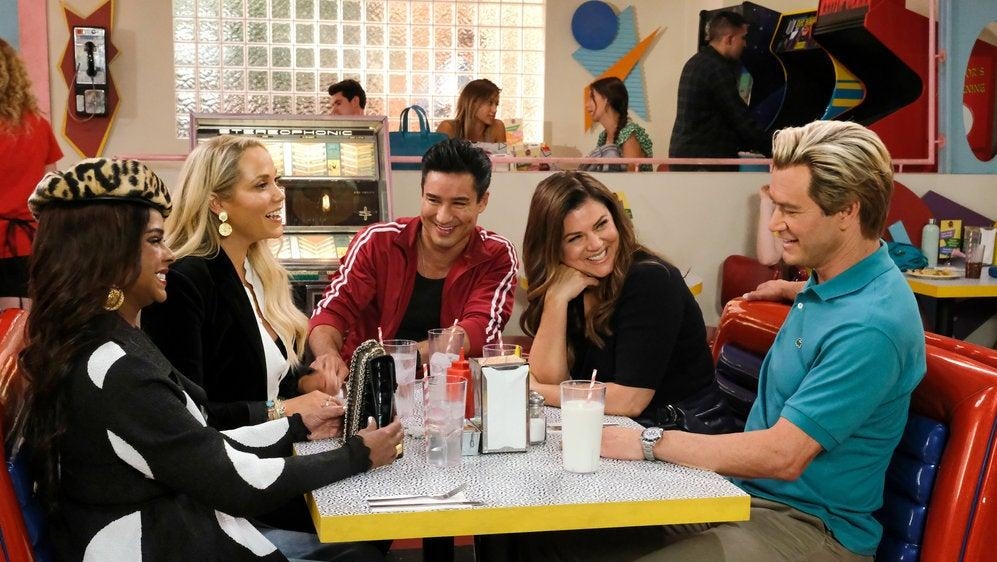A very funny Saved By The Bell still can’t figure out its audience in its second season
The Peacock reboot of the much-loved '90s teen sitcom returns with a new, even quirkier season

The first season of the Saved By The Bell reboot was notable for a few things. For one, it chose to end its finale with a pandemic taking over the world of Bayside. For another, the series answered the question, “How do you reboot a popular TV show that is now fundamentally retrograde” with “By making it utterly unhinged.”
The second season continues to deal with the effects of its characters having spent a year apart (though not wearing masks around each other ever), while getting weirder and weirder. It makes for an odd pairing; SBTB will attempt to deliver on the real pathos of its characters going through various emotional challenges, like a new crush or losing an old friend, while simultaneously existing in a universe in which a middle-aged Zack Morris (Mark-Paul Gosselaar) causes a crowd of people to lose their minds by perfectly flipping a bottle onstage.
If you have not already been watching this show, it is sort of hard to overstate how strange it is. It takes stock character types (the cool troublemaker, the overachieving good girl, the mean popular girl), then drops them into a universe where the rules of logic and physics don’t exactly apply. It’s also very, very funny, and in the second season proves even more willing to embrace its bizarre universe.
Take that overachieving good girl, Daisy (Haskiri Velazquez). For the uninitiated, she’s the main character, gifted with Zack Morris’ patented ability to start and stop time, and in an early season conflict, confronts the possibility that she might not get to be student council president again following the quarantine year. It sets up some standard sitcom stuff—who is she if she’s not student council president anymore, etc. Or as she puts it, “I’m bad at sports and I’m not horny enough to be a horse girl.” Or take the troublemaker, Mac Morris (Mitchell Hoog), who can be summed up as a “demon sprite.” At one point his mother, Kelly Morris née Kapowski (Tiffani Thiessen), casually explains that the medicine he takes makes him “The Omen.”
In other words, the show continues to bear the unmistakable signs that a 30 Rock alum created it—in this case Tracey Wigfield, who also made the underappreciated Great News. The joke density doesn’t compare to 30 Rock’s, but SBTB shows a distinct ability to generate turns of phrase that are as unexpected as they are hilarious.
Where the show struggles is in balancing whatever the hell it’s supposed to be. It’s hard not to watch and wonder, over and over, who it’s for. Is it for aging millennials with fond memories of watching the original in reruns as a kid? Or is it for the teens of today, who are possibly less invested in what happened to Joss Whedon, whose travails are mentioned? These questions are a sign of how much this SBTB functions as a show with earnest teen-oriented plots run through a machine of ’90s and early ’00s references.
By far, the characters that suffer most from this framing are the returning members of the original show. The actors are endearingly game, but the show leans on them too much in the second season, and they’re the most likely to be stranded with overly sincere plotlines. Worse, they’re stuck with the impossible juggling act of landing storylines about what it’s like to be middle-aged and still obsessed with your high school years, while simultaneously apologizing for the shortcomings of the original series and being semi-cognizant that they lived in a sitcom.
It’s an emotional spectrum that often proves shaky territory, although it does offer the hilarity of A.C. Slater (Mario Lopez), incredibly disturbed, trying to piece together whether or not he had a mom, since the original show only ever mentioned his dad. But too often it means the wacky hijinks get stopped to build a slow-burn reunion romance between Jessie Spano (Elizabeth Berkley Lauren) and Slater. It’s hard to get invested in storylines like this when it means time away from Mac’s ability to bend space and time, or from a sweet exploration of one character’s first same-sex romance.
The young people are the ones who make the show pop, and the over-reliance on the adults means less time spent with each of the kids, who fared better in the first season. Velazquez and Hoog still get the most to do and land their overachieving nerd/demon sprite jokes with aplomb. But Aisha (Alycia Pascual-Pena) and Devaunte (Dexter Darden) are too often forced into the background, while Lexi (Josie Totah) spends so much of her time acting as a foil for other characters that she randomly has an office at the high school where she can counsel people. And Jamie (Belmont Cameli) has a crisis about how he doesn’t really do anything. It’s a bit on the nose.
At some point, Saved By The Bell will probably need to resolve its identity crisis, and figure out how to balance the nostalgia force of its older characters with a cast of appealing young actors off-handedly wondering why the only restaurant they ever go to is The Max. It’s not that checking in with Zack, Kelly, and the rest of the gang isn’t fun when they do appear. It’s just that, it’s Mac and Daisy’s turn now, a fact that is acknowledged in explicit ways in the dialogue. It would be nice if the show itself had more confidence in them.